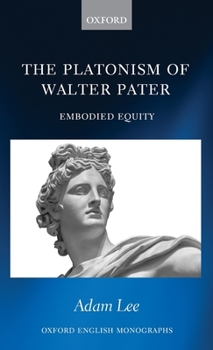The Platonism of Walter Pater: Embodied Equity
As a teacher of Plato in Oxford's Literae Humaniores, Walter Pater was informed by philosophy from his earliest essays to his last book. The Platonism of Walter Pater examines Pater's deep engagement with Platonism throughout his career. It overturns his reputation as a superficial aesthete known mainly for his 'Conclusion' to The Renaissance to reposition his contribution to literature and the history of ideas. In his criticism and fiction, including his studies on myth, Pater was influenced by several of Plato's dialogues. Phaedrus, Symposium, Theaetetus, Cratylus, and The Republic informed his philosophy of beauty, history, myth, knowledge, ethics, language, and style. As a philosopher, critic, and artist, Plato embodied what it meant to be an author to Pater, who imitated his creative practice from vision to expression. For Pater Platonism was also a point of contact with his contemporaries, including Matthew Arnold and Oscar Wilde, offering a means to take new measure of their literary relationships. Using the interdisciplinary critical tools of Pater's own educational milieu which combined literature, philosophy, and classics, The Platonism of Walter Pater repositions the importance Pater's contribution to literature and the history of ideas.
Format:Hardcover
Language:English
ISBN:0198848536
ISBN13:9780198848530
Release Date:March 2020
Publisher:Oxford University Press
Length:278 Pages
Weight:1.00 lbs.
Dimensions:0.9" x 5.4" x 8.6"
Customer Reviews
0 rating





